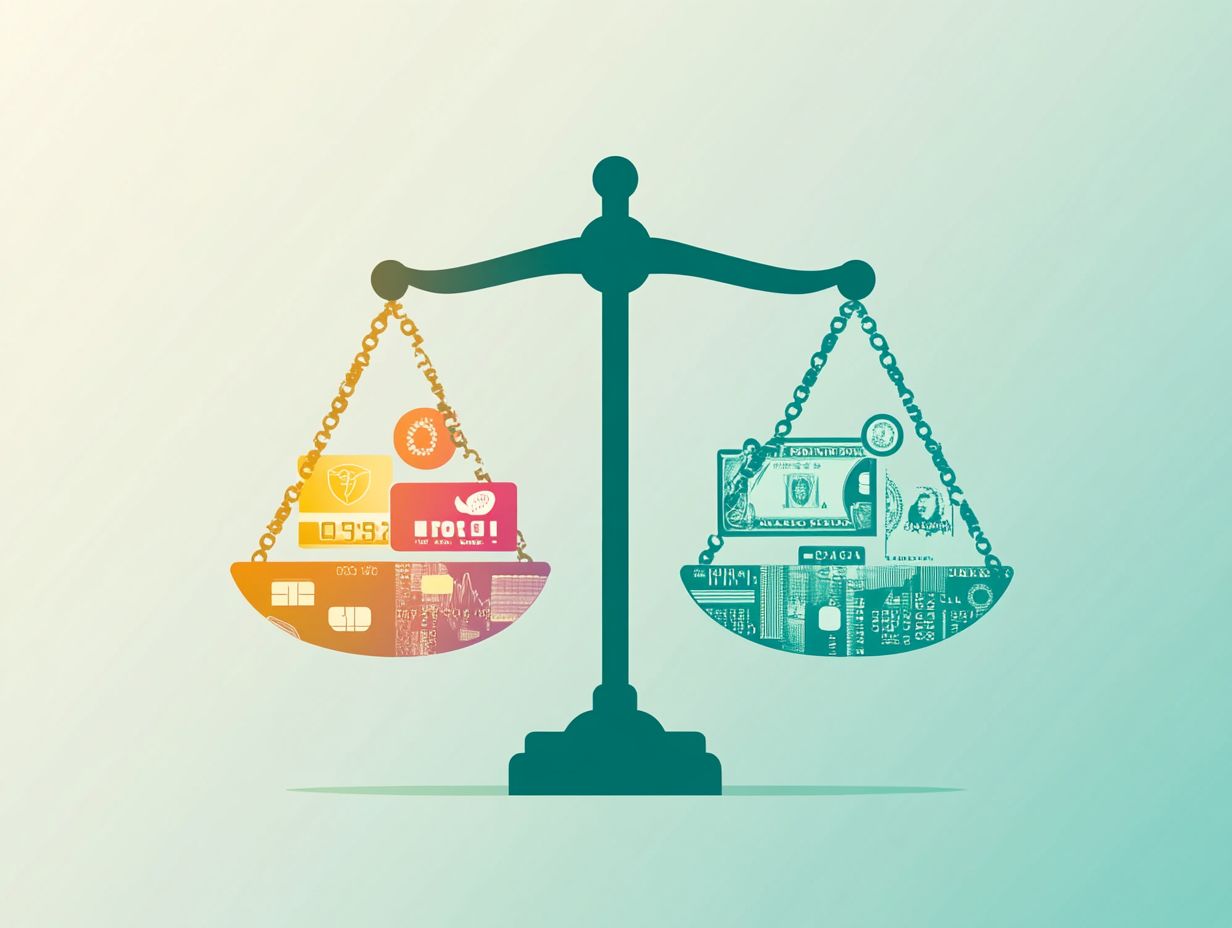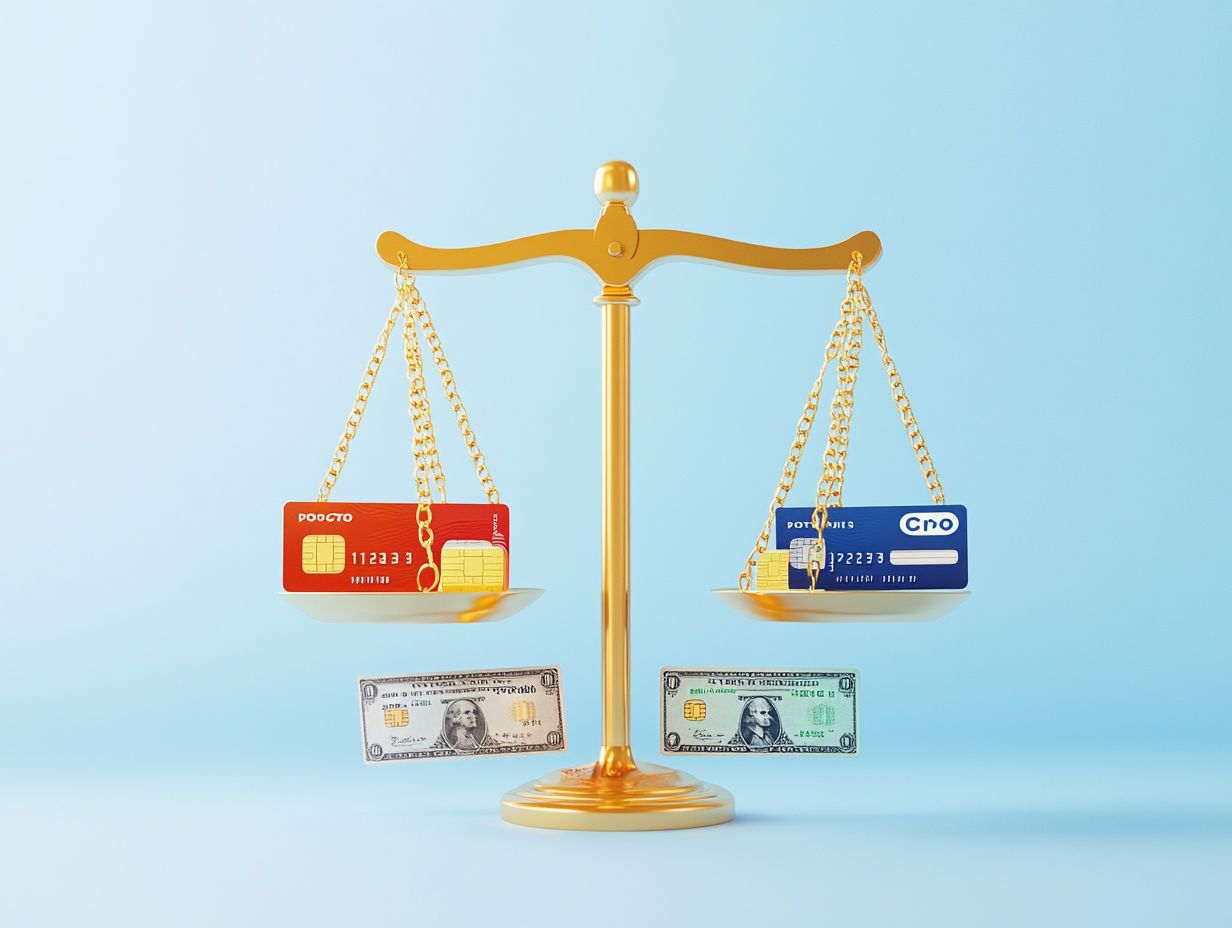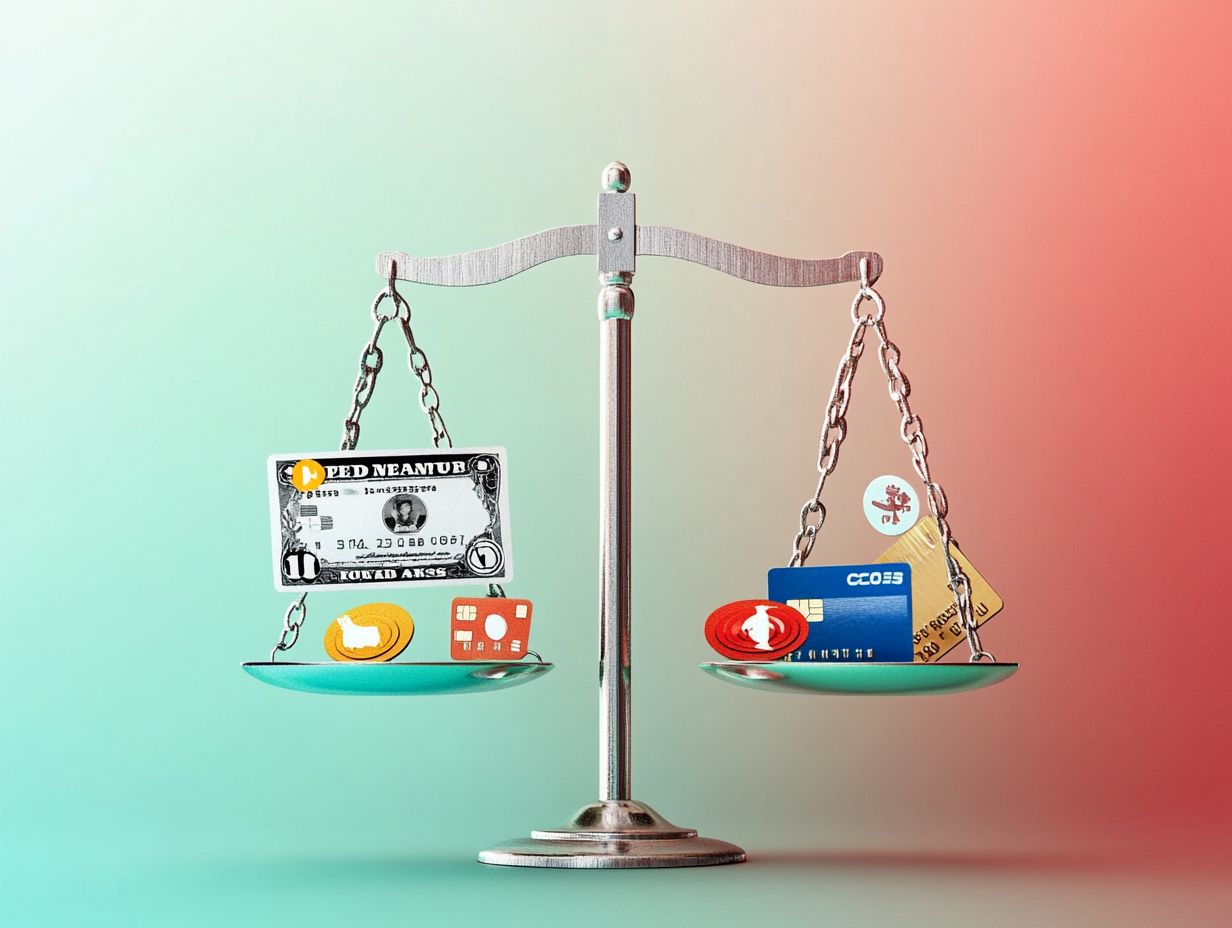The Pros and Cons of Using Credit Cards
Credit cards can be a double-edged sword, offering both enticing benefits and potential pitfalls for you as a consumer. Understanding how they operate is crucial because they provide rewards, convenience, and security while also presenting risks like accumulating debt and incurring interest charges.
This article explores the advantages and disadvantages of credit cards, offers tips for responsible usage, and highlights alternatives that may suit your financial needs better. Whether you’re a seasoned cardholder or considering your first credit card, valuable insights await you!
Contents
- Key Takeaways:
- Benefits of Using Credit Cards
- What to Watch Out For When Using Credit Cards
- Tips for Responsible Credit Card Use
- Alternatives to Credit Cards
- Frequently Asked Questions
- What benefits do credit cards offer?
- What are the potential drawbacks of using credit cards?
- Are there any hidden fees associated with credit cards?
- What is the impact of using credit cards on your credit score?
- Do all credit cards offer rewards and cashback programs?
- Can credit cards offer purchase protection?
Key Takeaways:
- Credit cards offer rewards and cashback, making them a convenient and potentially profitable payment method.
- Using credit cards can also lead to debt and interest charges, as well as damage to your credit score if not used responsibly.
- To maximize benefits, use credit cards wisely and consider alternatives like debit cards or cash for better financial management.
What are Credit Cards?
Credit cards are powerful financial tools that let you borrow money for purchases, offering a flexible way to manage your spending. They can significantly impact your financial decisions and budgeting strategies. With features like building credit history, earning rewards, and having protections for buyers, these cards offer many perks. However, responsible usage is key to avoiding potential debt and high-interest rates.
Credit cards help you manage your money. With different types available secured, unsecured, and rewards cards they cater to various needs and financial situations.
Each card has a predefined credit limit, which is the maximum amount you can spend. It’s crucial to keep an eye on potential interest charges that can accumulate if you don’t pay off your balance in full. Your payment history is vital in shaping your credit profile, influencing how credit bureaus assess your overall creditworthiness and determining future credit opportunities from card issuers.
Benefits of Using Credit Cards
Using credit cards provides numerous benefits that can enhance your financial well-being while offering essential consumer protections, making them an attractive option for managing expenses.
With rewards programs that provide cash back and travel perks such as insurance and no foreign transaction fees, responsible usage can yield significant advantages that align with your financial aspirations.
Rewards and Cashback
Rewards and cashback programs are some of the most appealing features of modern credit cards, encouraging you to spend wisely while reaping the benefits. Many credit card issuers offer cashback on your everyday purchases, letting you accumulate statement credits and enhance your financial advantages through strategic spending.
Your credit activity is crucial here, as various card options cater to different preferences. For example, some programs excel in providing travel points for frequent travelers, enabling you to turn purchases into flights or hotel stays. Others attract you with generous bonus offers during promotional periods, rewarding new members with impressive sign-up incentives.
To find the perfect rewards program, analyze your spending habits and lifestyle choices. This way, you can ensure that the program aligns with your regular expenses and maximizes your benefits.
Convenience and Security

Credit cards offer you unparalleled convenience, making it effortless to complete transactions both online and in-store. They provide multiple layers of security to shield you from unauthorized charges. With robust fraud protection policies in place, you can make purchases confidently, knowing your financial details are safeguarded.
In today’s fast-paced world, credit cards simplify your everyday expenses. Features like contactless payments and mobile wallets allow you to complete transactions with just a tap of your card or smartphone. This modern payment method not only streamlines the checkout process but also enhances your budgeting capabilities through detailed spending reports.
Many providers implement advanced security measures, such as real-time fraud alerts and zero liability for unauthorized purchases, enabling you to manage your finances effectively while minimizing risks. With these conveniences at your fingertips, you can enjoy a worry-free shopping experience, fully assured that your accounts are well-protected.
What to Watch Out For When Using Credit Cards
Credit cards can provide a wealth of benefits, yet they also carry certain drawbacks that may lead to potential debt and adversely affect your financial health if not managed with care.
The high-interest rates on unpaid balances, coupled with late fees, can swiftly escalate your financial burden. The temptation to rack up high balances can put you in a tough financial spot.
Potential Debt and Interest Charges
Potential debt and interest charges loom large when it comes to using credit cards, especially if you don t keep a budget or practice responsible spending. Relying too heavily on credit can quickly lead you to exceed your limit, incur late fees, and ultimately spiral into debt thanks to those pesky high-interest rates on outstanding balances.
When you carry balances from month to month, interest charges can pile up faster than you might expect. This can compound your debt and complicate your ability to pay it off. Understanding your credit usage ratio this is how much credit you use compared to your total limit is key to staying on top of your finances!
Keeping this ratio low can work wonders for your credit score and pave the way for more favorable terms on future credit opportunities. Setting reminders for payment due dates is another smart move to help you dodge late fees and maintain a pristine credit history.
By creating a realistic budget and prioritizing payments, you can further reduce debt, allowing you to navigate the world of credit with greater confidence and efficiency.
Impact on Credit Score
The impact of credit card usage on your credit score is a vital aspect of your financial health. Credit bureaus assess various factors, including your payment history, credit usage ratio, and overall credit activity. When you use credit cards responsibly, you can build and enhance your credit score. Conversely, mismanagement can lead to negative consequences that may hinder your future financial opportunities.
Understanding how credit scores are calculated is essential for anyone aiming to improve their financial standing. Timely payments are crucial they showcase your reliability and commitment, directly affecting your payment history.
Keeping your credit usage ratio low ideally below 30% signals to lenders that you can manage credit without overextending yourself. Employing strategies like setting up automated payments or regularly reviewing your credit reports can significantly enhance your credit profile.
The long-term benefits can be game-changing for your financial future, including lower interest rates on loans, improved chances of mortgage approvals, and ultimately, a greater sense of financial security.
Start monitoring your credit today to secure a brighter financial future!
Tips for Responsible Credit Card Use

Practicing responsible credit card use is crucial for safeguarding your financial health and steering clear of the pitfalls of credit card debt. It all starts with effective budget management.
By understanding your payment options and carefully tracking your spending, you can unlock the full potential of your credit cards while minimizing the associated risks. Educating yourself on credit practices is essential too.
How to Avoid Debt and Maximize Benefits
To avoid debt while maximizing the benefits of your credit cards, adopt strategies such as carefully tracking your spending and understanding your rewards programs.
By planning your purchases and monitoring your payment history, you can leverage your credit cards effectively without falling into financial traps.
One effective method is setting clear spending limits that align with your budget. This helps mitigate the risk of overspending.
Utilizing rewards for essential purchases, like groceries or gas, allows you to optimize your points or cash back without straying from necessary expenses.
Knowing about promotional offers, such as sign-up bonuses or cash-back incentives, can enhance the value you gain from your purchases. By incorporating these financial management techniques, you can relish the perks of credit cards while maintaining a solid financial stance.
Alternatives to Credit Cards
If you prefer not to use credit cards, numerous alternatives can serve as effective payment options and financial tools.
Consider utilizing debit cards, personal loans, or cash payments. These choices help manage your budget while avoiding the pitfalls associated with credit card debt.
Other Payment Options to Consider
Other payment options include debit cards and personal loans, each offering unique benefits that align with your diverse financial strategies.
By utilizing these alternatives, you can maintain better control over your spending and avoid the high costs often associated with credit card debt.
When you opt for debit cards, you re spending only what you have in your account, encouraging healthier financial habits compared to credit cards that can easily lead to overspending.
Personal loans can be a valuable resource for larger expenses, allowing you to manage repayments with fixed rates, providing predictability in your budgeting.
Take the time to weigh your options! It’s important to understand how each method fits into your broader financial picture, so you can make informed and strategic decisions that truly serve your financial goals.
Frequently Asked Questions

What benefits do credit cards offer?
Some of the pros of using credit cards include convenience, building credit, rewards and cashback programs, and purchase protection.
What are the potential drawbacks of using credit cards?
The cons include high interest rates, overspending and debt, fees and penalties, and potential damage to your credit score.
Yes, credit card companies often charge fees such as annual fees, late payment fees, and balance transfer fees. It’s important to read the fine print and understand all fees associated with a credit card.
What is the impact of using credit cards on your credit score?
Using credit cards responsibly can improve your credit score by demonstrating a history of timely payments and responsible credit management. However, excessive debt and late payments can negatively impact your score.
Do all credit cards offer rewards and cashback programs?
No, not all credit cards offer rewards and cashback programs. It’s important to research and compare different credit card options to find one that suits your needs and spending habits.
Take control of your financial health today!
Can credit cards offer purchase protection?
Absolutely! Many credit cards provide protection for your purchases.
This can help cover the costs of items that are stolen or damaged. Just remember to check your card’s terms and conditions, as coverage can vary.






